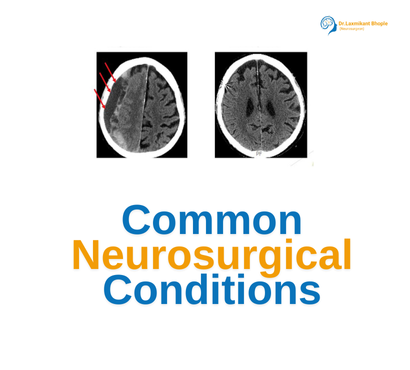The human nervous system, comprising the brain, spinal cord, and peripheral nerves, is central to every bodily function. Neurosurgery plays a crucial role in diagnosing and treating disorders affecting this system. This blog delves into common neurosurgical conditions, their symptoms, and the treatment options available.
What Is Neurosurgery?
Neurosurgery is a specialized field of medicine focusing on the surgical treatment of disorders affecting the nervous system. It includes procedures on the brain, spine, and peripheral nerves to alleviate pain, restore function, and improve quality of life.
Common Neurosurgical Conditions
1. Brain Tumors
Brain tumors are abnormal growths of cells in the brain. They can be benign (non-cancerous) or malignant (cancerous).
Symptoms:
- Persistent headaches.
- Nausea and vomiting.
- Seizures.
- Vision or speech difficulties.
Treatment:
- Surgery to remove the tumor.
- Radiation therapy or chemotherapy for malignant cases.
2. Spinal Disorders
The spine is prone to various conditions that may require surgical intervention.
a) Herniated Discs
Occurs when the soft inner material of a spinal disc pushes through its outer layer, compressing nearby nerves.
Symptoms:
- Back pain radiating to the legs.
- Tingling or numbness.
- Muscle weakness.
Treatment:
- Microdiscectomy or spinal fusion.
b) Spinal Stenosis
Narrowing of the spinal canal, leading to nerve compression.
Symptoms:
- Pain in the back or neck.
- Weakness in the legs or arms.
- Difficulty walking.
Treatment:
- Laminectomy to relieve pressure on nerves.
3. Traumatic Brain Injuries (TBI)
TBI occurs due to external trauma to the head, affecting brain function.
Symptoms:
- Loss of consciousness.
- Confusion or memory issues.
- Seizures or persistent headaches.
Treatment:
- Emergency surgery to reduce swelling or stop bleeding.
- Long-term rehabilitation.
4. Nerve Compression Disorders
a) Carpal Tunnel Syndrome
Compression of the median nerve in the wrist.
Symptoms:
- Numbness or tingling in the fingers.
- Weak grip strength.
Treatment:
- Endoscopic or open carpal tunnel release surgery.
b) Sciatica
Compression of the sciatic nerve, often due to herniated discs.
Symptoms:
- Sharp pain radiating from the lower back to the legs.
- Difficulty walking or standing.
Treatment:
- Epidural injections or minimally invasive discectomy.
5. Hydrocephalus
An abnormal accumulation of cerebrospinal fluid (CSF) in the brain, leading to increased pressure.
Symptoms:
- Enlarged head in infants.
- Headaches and nausea in adults.
- Balance issues.
Treatment:
- Ventriculoperitoneal (VP) shunt surgery to drain excess fluid.
6. Aneurysms
Aneurysms are bulges in blood vessel walls, typically in the brain, that may rupture and cause life-threatening bleeding.
Symptoms:
- Sudden, severe headache.
- Vision disturbances.
- Loss of consciousness.
Treatment:
- Clipping or coiling procedures to prevent rupture.
When to Consult a Neurosurgeon
- Persistent or severe headaches.
- Sudden changes in vision, balance, or speech.
- Numbness, tingling, or weakness in limbs.
- Head or spine injuries from accidents.
Early diagnosis and intervention can prevent complications and improve recovery outcomes.
Advances in Neurosurgery
1. Minimally Invasive Techniques
- Smaller incisions and faster recovery.
- Procedures like endoscopic brain surgery or robotic spine surgery.
2. Intraoperative Imaging
- Real-time MRI or CT scans ensure precision during surgeries.
3. Neurostimulation Devices
- Used for conditions like Parkinson’s disease or chronic pain.
Preparing for Neurosurgery
1. Pre-Surgery Evaluation
- Detailed imaging studies like MRI or CT scans.
- Blood tests and health assessments.
2. Lifestyle Adjustments
- Stopping medications like blood thinners.
- Avoiding alcohol or smoking before surgery.
Recovery After Neurosurgery
Recovery depends on the type of surgery and the patient’s overall health. Common steps include:
- Physical therapy for mobility restoration.
- Occupational therapy for daily activities.
- Follow-up scans to monitor progress.
The Role of Neurosurgeons in Improving Lives
Neurosurgeons not only perform surgeries but also play a crucial role in pre- and post-operative care, guiding patients through every step of recovery. Their expertise helps patients regain mobility, reduce pain, and lead fulfilling lives.
Neurosurgical conditions may seem daunting, but with early diagnosis and expert care, many patients achieve remarkable recoveries. From treating life-threatening brain tumors to managing chronic back pain, neurosurgery continues to advance, offering hope and improved quality of life to countless individuals.
If you or a loved one experiences symptoms like chronic pain, neurological issues, or trauma, consult a neurosurgeon to explore the best treatment options.
FAQs
1. What conditions require neurosurgery?
A: Conditions like brain tumors, herniated discs, nerve compression, and aneurysms often require neurosurgical intervention.
2. Is neurosurgery risky?
A: While all surgeries carry risks, advances in technology and techniques have made neurosurgery safer and more effective.
3. How long does recovery take after neurosurgery?
A: Recovery varies by procedure, but most patients start rehabilitation within a few weeks and see significant improvement in 3-6 months.

